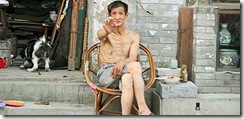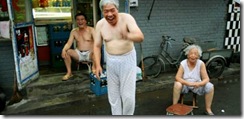From The Times
August 1, 2008
Beijing's 15 million residents have been given their sartorial and social instructions from the Capital Spiritual Civilisation Construction Commission
Jane Macartney in Beijing
If the men of Beijing think they can still emerge from their homes of a morning – unshaven, a bit smelly, still in their pyjamas and slippers – and saunter down to the supermarket or the public lavatories, they can think again: the etiquette police are in town and it is time to spruce up for the Olympics.
Even clothes that Chinese citizens of both sexes would consider smart may not be good enough: white socks worn with black shoes are out, leather skirts are frowned upon, bright nail varnish is a no and woe betide anyone whose colours clash.
Beijing’s 15 million residents have been given their sartorial and social instructions from the Capital Spiritual Civilisation Construction Commission, which has ruled on everything from what (and what not) to wear, how to shake hands and the etiquette of smoking and queueing. With the eyes of the world on Beijing, its residents will not be allowed to put a foot wrong or show a hair out of place.
Zheng Mojie, deputy director of the commission, said that campaigns over the past two years to stop spitting on the street and to teach people to queue had shown results. “The level of civility of the whole city has improved and a sound cultural and social environment has been assured for the success of the Olympic Games.”
The authorities, though, have deemed that more is clearly needed and have issued booklets to four million households across the city. The directions on etiquette stretch to thirty-six areas of behaviour and run to nine pages on an official website.
There is advice on shaking hands, how to use chopsticks at a banquet and personal grooming. “Men’s hair should not cover their eyebrows, ears or touch their collar,” the guide says. “Women should comb their hair appropriately for age, occupation and situation.” Men should shave daily, women should wear light make-up and both sexes should keep their mouths clean.
Rules are already in place ordering taxi drivers to go easy on their garlic consumption so that visitors will not be assailed by the bad breath of a cabbie who had pork and chive dumplings – a cheap favourite – for lunch, and even breakfast.
There should be no public displays of affection, feet should be kept slightly apart or in the shape of a V when standing and a handshake should not last more than three seconds. The first should not be much of a problem in a society that is traditionally conservative – although young couples can be spotted at dusk cuddling on park benches.
As for dress, the booklet advises against more than three colour groups in clothing and exhorts women to avoid clashing colours. Shudders of horror will greet anyone who has rolled up his trouser legs – a popular sight among men trying to ease the summer heat on trains and planes or in official meetings.
Naked chests in public places will also attract a scolding – although the booklet gives no specific instructions on a particularly popular summer vogue among Chinese men: rolling up one’s vest so that it rests just below the nipples and exposes the belly to the summer breezes.
Men with bare chests and older women who show their knees are among those committing sartorial misdemeanours listed in a new government guide
Women and girls get their fair share of fashion tips. Those of all ages should opt for slim skirts, but anyone with thicker legs should choose darker stockings. “Young girls can wear skirts three centimetres to six centimetres above the knee – but never too short. For middle-aged and older women, the skirt should be at least three centimetres below the knee.”
Leather skirts and transparent garments are not advised. “Clothes should not be too small, otherwise this makes people feel you are unreliable.” And fat people should avoid horizontal stripes.
These are just the latest in a slew of rules. A ban on spitting – accompanied by hefty fines – was introduced in 2006. However, few men pay attention: the pavements are splattered with gobs of phlegm and the espresso-machine sound of hawking can be heard everywhere.
Campaigns involving nearly a million volunteers are under way to to give etiquette tips at schools, universities and government offices. In some districts university students have been encouraged to visit villages and help to educate rural people.
Some of the advice may be such a cultural contradiction as to be impossible to implement. Don’t press others to drink at a banquet, and don’t fight over paying the bill. Both are essential to a successful evening.
A dressing down
Don’t
— Men should not allow their hair to grow over eyebrows, ears or collar
— Sport pyjamas in public
— Roll up trousers
— Bare chests
— Wear white socks with black shoes
— Wear high collar if they have a short neck
— Women should not wear leather skirts, transparent garments, clashing colours or more than three colour groups at once
— No resident should display affection in public
— Fight over who settles the bill
— Press others to drink at a banquet
Do
— Men should shave daily
— Plant their feet slightly apart, in the shape of a V
— Women should wear light make-up
— Comb hair appropriately for age, occupation and situation
— Darker stockings should be used to cover thicker ankles
— Match the length of skirt to age. Young girls can wear skirts three centimetres to six centimetres above the knee
— All residents should go easy on garlic and clean their mouths


No comments:
Post a Comment